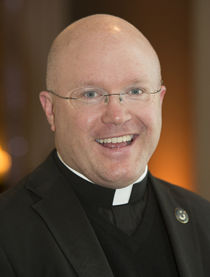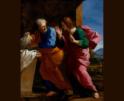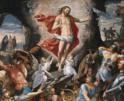
Faith

Landry
As we continue to examine, throughout this Jubilee of Mercy, God's call to recognize our need for, receive, be transformed by and share the extraordinary gift of God's merciful love, it's key to turn to the school of the Mass.
The Mass is, in fact, the great prayer of Divine Mercy. We enter in time into Christ's eternal mercy-obtaining intercession from the Upper Room, Golgotha and the Tomb. As Jesus' Bride and Body, we offer ourselves to the eternal Father together with -- as St. Faustina Kowalska taught us to pray -- Jesus' body, blood, soul and divinity in expiation for our sins and the sins of the world.
The Mass, the Second Vatican Council emphatically taught, is the source and summit of the Christian life, meaning that someone living in a fully Christian way will find in the Mass the starting point from which everything in life flows and the goal toward which everything is directed.
The Mass, therefore, must be the root and fruit of the Jubilee of Mercy. It is the Church's great mystagogy of mercy, teaching us about God's forgiveness not in a dry lecture hall but through helping us to jump into the deep ocean of God's merciful.
The ancient Christian aphorism, lex orandi lex credendi lex vivendi, reminds us that how we pray influences how we believe and how we live; the more we pray for God's mercy, the more our faith in it will grow and the more it will become our way of life. And that law is certainly confirmed in the school of mercy that is the Mass.
That school commences even before Mass begins, in the prayers the priest says as he vests. Washing his hands, he prays that the Lord will "wipe away all stain, so that I may be able to serve thee in purity of mind and body." Putting the amice over his head and neck he asks the Lord to set on his head "the helmet of salvation" and "fend off all the assaults of the devil." Donning the white alb, he petitions, "Make me white, O Lord, and cleanse my heart [by] being made white in the Blood of the Lamb." Wrapping the cincture around his waist, he asks the Lord to gird him "with the cincture of purity and quench in my heart the fire of concupiscence." Hanging the stole around his neck, he begs, "Lord, restore the stole of immortality that I lost through the prevarication" of Adam and Eve, and, "unworthy as I am to approach thy sacred mysteries," he begs for the grace of "eternal joy." Finally, as he assumes the chasuble, he binds himself to God's salvific plan, begging for the grace to carry the Lord's yoke of mercy so as to merit his grace. He prepares for Mass, basically, by putting on the armor of God's mercy, so that from his hands to his waist to his head, he may become a witness and minister of that mercy.
Right at the beginning of Mass, everyone focuses immediately on God's mercy, acknowledging our sins in order to "prepare ourselves to celebrate the sacred mysteries." We admit humbly, in the Confiteor, that we have "greatly sinned" by our own "most grievous fault," and ask for the saints and others to pray for us for God's pardon. The second form of the Penitential Rite has a dialogue that we can use this year as a beautiful aspiration: "Have mercy on us, O Lord, for we have sinned against you. Show us, O Lord, your mercy, and grant us your salvation." And then we focus respectively on the mercy of God the Father (Kyrie Eleison), Son (Christe Eleison), and Holy Spirit (Kyrie Eleison). In those Masses with a Gloria, we ask God to "receive our prayer," which is precisely our petition that the Lamb of God who takes away the sins of the world will have mercy on us.
The Eucharistic Prayers (Eps) all contain special references to God's mercy. We begin EP I with the words, "To you, therefore, most merciful Father" and ask his special blessing for us "who, though sinners, hope in your abundant mercies." In EP II, we implore, "Have mercy on us all we pray." In EP III, we ask God the Father to recognize "the sacrificial Victim by whose death you will to reconcile us to yourself" and to grant that "this Sacrifice of our reconciliation" may "advance the peace and salvation of all the world." In EP IV, we pray powerfully, "Even when through disobedience [the human person] had lost your friendship, you did not abandon him to the domain of death. For you came in mercy to the aid of all," and entreat, "To all of us, your children, grant, O merciful Father, that we may enter into a heavenly inheritance ... [where] with the whole of creation, freed from the corruption of sin and death" we hope to glorify him forever.
In the Memorial Acclamation, we proclaim that we're sinners in need of a Redeemer, saying, "Save us, Savior of the world, for by your Cross and Resurrection you have set us free."
In the Lord's Prayer, we ponder our need to forgive in order to be open to receive God's gift of forgiveness, saying together, "Forgive us our trespasses as we forgive those who trespass against us." After the Our Father, the priest asks God, "That by the help of your mercy, we may be always free from sin and safe from all distress" as we await Christ's coming on the altar and at the end of time.
In the Lamb of God, we turn to the Eucharistic Jesus "takes away the sins of the world," and ask, "Have mercy on us" and "grant us peace." Then we announce that because of our sinfulness, we're not worthy to receive Jesus, but petition God with humble confidence: "only say the world and my soul shall be healed."
These are prayers that every Catholic can pray devotionally through this Jubilee of Mercy in order to enter more fully into God's mercy through the Mass.
We can also focus on the two Eucharistic Prayers of Reconciliation (EPR) that priests have been encouraged to pray this holy year. Used normally during Lent, they are particularly expressive of Divine Mercy.
In EPR I, the Church addresses God: "Being rich in mercy, you constantly offer pardon and call on sinners to trust in your forgiveness alone. Never did you turn away from us and, ... even now you set before your people a time of grace and reconciliation."
Before consecrating the Host, the priest prays, "Indeed though we once were lost and could not approach you, you loved us with the greatest love: for your Son... handed himself over to death and did not disdain to be nailed for our sake to the wood of the Cross," and before consecrating the Precious Blood he adds, that Jesus, "knowing he was about to reconcile all things in himself through his blood to be shed on the Cross," took the chalice.
There's also a special prayer as well for "our deceased brothers and sisters who we humbly commend to your mercy."
In EPR II, the Church describes Jesus as "the hand you [God] extend to sinners," and summarizes the entire Eucharistic Prayer as a petition of mercy, saying, "When we ourselves had turned away from you on account of our sins, you brought us back to be reconciled, O Lord, so that, converted at last to you, we might love one another through your Son, whom for our sake you handed over to death. And now, celebrating the reconciliation Christ has brought us...."
Since the Mass is the great prayer of God's mercy, the more and the better we pray it, the more we will become "merciful like the Father," through communion with Jesus, "Mercy incarnate."
- Father Roger J. Landry is a priest of the Diocese of Fall River, Massachusetts, who works for the Holy See’s Permanent Observer Mission to the United Nations.
Recent articles in the Faith & Family section
-
Through to PentecostFather Robert M. O'Grady
-
Behold the ManArchbishop Richard G. Henning
-
Living a Life of GratitudeMaureen Crowley Heil
-
New morningScott Hahn
-
Easter and its datingMsgr. Liam Bergin























